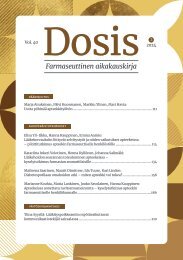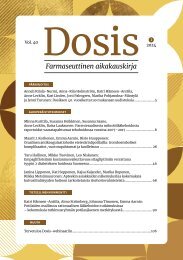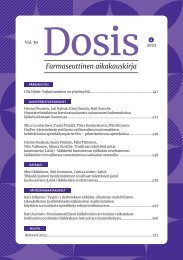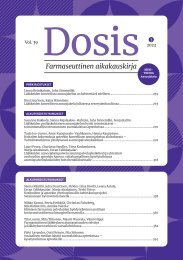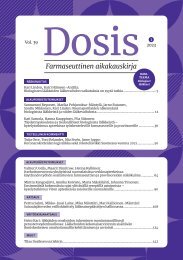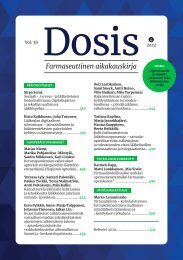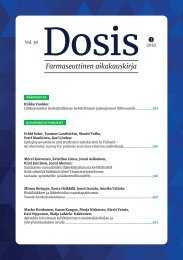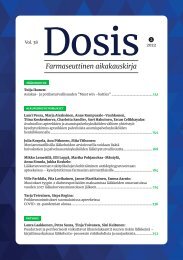DOSIS 2/2023
Farmaseuttinen aikakauskirja DOSIS 2/2023 vol.39 5uomen Farmasialiitto ry
Farmaseuttinen aikakauskirja DOSIS 2/2023 vol.39 5uomen Farmasialiitto ry
You also want an ePaper? Increase the reach of your titles
YUMPU automatically turns print PDFs into web optimized ePapers that Google loves.
minen olisi ollut tutkimuskysymysten kannalta<br />
tärkeää. Mukavuusotannan etu kuitenkin on,<br />
että haastateltavat ovat olleet kiinnostuneita<br />
tutkimuksesta ja heillä on ollut aiheesta näkemyksiä<br />
ja kokemuksia. Tutkimus toteutettiin<br />
COVID19-pandemian vuoksi puhelimitse, mikä<br />
saattoi helpottaa tutkimukseen osallistumista.<br />
Toisaalta puhelinhaastattelussa haastattelijalla<br />
ei ole mahdollisuutta tulkita sanatonta viestintää<br />
tai eleitä ja siten haastatteluissa ei välttämättä<br />
päästä käsittelemään aiheita syvällisesti.<br />
Haastateltavien määrä oli riittävä, koska<br />
16 haastattelua toi esille tutkimuskysymysten<br />
kannalta samoja näkökulmia. Aineistonkeruun<br />
ja analysoinnin aikana käytiin keskustelua<br />
koko tutkimusryhmän kanssa. Lisäksi analyysissa<br />
käytettiin luokittelun lisäksi laskemista ja<br />
taulukointi, joita pidetään tutkimuksen luotettavuutta<br />
lisäävinä tekijöinä (Hämeen-Anttila ja<br />
Katajavuori 2021c).<br />
Johtopäätökset<br />
Pitkäaikaissairaat kokivat lääkehoidon seurannan<br />
tärkeäksi osaksi lääkehoitoa. Lääkehoidon<br />
seurannassa pitkäaikaissairaan oma rooli on<br />
keskeinen, mutta kokonaisvastuu siitä on lääkärillä.<br />
Apteekin rooli lääkehoidon seurannassa<br />
on sen sijaan vähäinen. Lääkehoidon seurannan<br />
sisältö ja siihen osallistuvien ammattilaisten<br />
sekä potilaan välinen tehtävän- ja vastuunjako<br />
tulisi määritellä kansallisesti, jotta voidaan<br />
edistää pitkäaikaisten lääkehoitojen tarkoituksenmukaista<br />
ja turvallista toteutumista.<br />
Samalla pitkäaikaissairaiden osallisuus lääkehoidon<br />
seurannassa tulisi tunnistaa ja hyödyntää<br />
terveydenhuollossa nykyistä paremmin.<br />
Summary<br />
Persons with chronic illnesses<br />
experiences with medication monitoring<br />
and insights into patients’ and<br />
healthcare providers’ involvement in<br />
medication monitoring – An interview<br />
study for pharmacy customers<br />
Elina Hanslian<br />
M.Sc. (Pharm)<br />
School of Pharmacy<br />
University of Eastern Finland<br />
Johanna Timonen<br />
Adjunct Professor, Ph.D (Pharm.),<br />
Senior researcher<br />
School of Pharmacy<br />
University of Eastern Finland<br />
Jouko Savolainen<br />
Ph.D (Pharm.), eMBA, Director<br />
University of Eastern Finland Pharmacy<br />
University of Eastern Finland<br />
Piia Siitonen<br />
Ph.D (Pharm.), University teacher<br />
School of Pharmacy<br />
University of Eastern Finland<br />
Hanna Kauppinen*<br />
Ph.D (Pharm.), University teacher<br />
School of Pharmacy<br />
Faculty of Health Sciences<br />
University of Eastern Finland<br />
* Kirjeenvaihto<br />
Introduction<br />
Chronic conditions are generally treated with<br />
long-term medication therapies. Medication<br />
monitoring is a stage of medication use process,<br />
which aims to ensure the effectiveness,<br />
appropriateness and safety of these therapies.<br />
The aim of this study was to explore experiences<br />
with and insights into medication monitoring<br />
in persons with chronic illnesses. The<br />
study also examined persons’ insights into<br />
their involvement with medication monitoring<br />
and the roles of health care professionals<br />
in providing it.<br />
Methods<br />
The study was conducted as an interview study<br />
in the winter of 2020–2021 for adult pharmacy<br />
customers who had prescriptions filled<br />
for medication for the treatment of a chronic<br />
condition. Interviews were conducted by telephone,<br />
and all the interviews were taperecorded,<br />
transcribed and analysed using content<br />
analysis.<br />
Results<br />
Sixteen persons with a chronic illness participated<br />
in the study. Some of the participants<br />
(n = 6) had discussed the goals of their medication<br />
treatment with a physician. Target values<br />
to be monitored, such as target blood pressure,<br />
were the most common discussed treatment<br />
goals. Half of the participants (n = 8) had<br />
received guidance on monitoring practices for<br />
their medication therapy in healthcare, and<br />
monitoring was regularly carried out according<br />
to the provided guidance. Participants<br />
reported that their medication monitoring in<br />
healthcare most commonly included laboratory<br />
tests (n = 11) and contact with physician (n<br />
= 11) either in a practice or by phone. Half of the<br />
participants (n = 8) had not received guidance<br />
on medication monitoring practices in healthcare,<br />
and monitoring may not have occurred<br />
at all among them. However, the participants<br />
regarded medication monitoring as important,<br />
and were mostly (n = 10) satisfied with its adequacy.<br />
Participants considered their involvement<br />
in medication monitoring essential. They<br />
saw physicians as having overall responsibility<br />
for treatment monitoring, but they noted<br />
186 Dosis Vol. 39 2/<strong>2023</strong> © Suomen Farmasialiitto ry Suomen Farmasialiitto ry © 2/<strong>2023</strong> Vol. 39 Dosis 187




